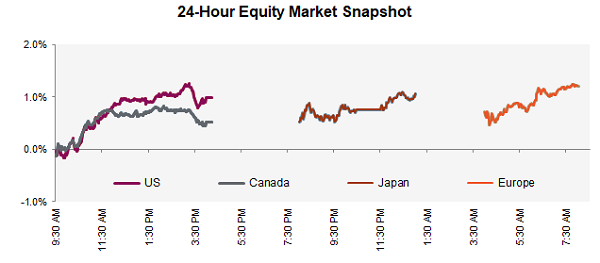Today
Futures climbed this morning after the U.S. Senate passed the debt-limit deal with a 63-36 majority, ending the threat of a default. The rise comes despite data that showed the U.S. continuing to add jobs in May, after NFP rose more than expected. Payrolls in the public and private sector increased by 339,000 for the month, much higher than the 190,000 estimate, marking the 29th straight month of positive job growth. Investors are now left to wonder if the Fed will shift from their recently dovish tone and hike rates at their next meeting. Despite these concerns, it appears that the market is choosing to focus less on the jobs numbers and concentrating on wage increases that showed lighter-than-expected inflation and an unemployment rate that ticked higher.
China announced a new round of measures to help the ailing property market after existing policies failed to sustain a rebound in the sector - including reducing the down payment in some non-core neighborhoods of major cities; lowering agent commissions on transactions, and further relaxing restrictions for residential purchases under the guidance of the State Council. The government may also be looking to enhance some earlier policies laid out in the sweeping 16-point rescue package it rolled out last year.
With a tight labour market and higher borrowing costs, Canada's residential construction activity continues to slow, with housing starts expected to decline to 212,000 units this year from 262,000 in 2022. Earlier this week, the Canadian Home Builders' Association said 64% of builders expect to have fewer starts this year than last. Adding to this, investment in residential building construction, after adjusting for inflation, fell in March to its lowest level since June 2020. All these signs spell bad news for the BoC who is seeking to lower inflation and the federal government who has vowed to improve housing affordability.
A new survey found that a shortage of skilled workers and funding is hurting manufacturers' ability to take up new technology. The poll found that 40% have yet to start or are just beginning a digital transformation, with one-third pointing to a lack of skilled workers as a key hurdle to adopting fresh tech. The positive news is that help may be on the way. In the federal government’s spring budget, officials zeroed in on more immigration by skilled workers as well as green technology, rolling out a clean tech manufacturing investment tax credit pegged at $4.5 billion over five years.
The federal government is backing up to $3 billion in loans for Trans Mountain Corp, the crown corporation building the long-delayed oil pipeline expansion to Canada's Pacific Coast. The Trans Mountain Expansion will nearly triple the flow of crude from Alberta's oil sands to BC, to 890,000 bpd and is intended to boost access to Asian refining markets. The federal government bought the Trans Mountain pipeline in 2018 to ensure the expansion project got built and provided a $10 billion loan guarantee to TMC, however, the project has been hit with roadblocks including regulatory hurdles, environmental opposition, and construction delays. In total, the project is expected to cost $30.9 billion, quadrupling from the $7.4 billion budgeted in 2017.
Wealthy countries have pledged $100 billion a year to help reduce the effects of global warming, but you may be surprised where that money actually going. A new report found that countries have been funding projects that that have nothing to do with climate change and reporting that funding to the UN as part of their giving total. So where did the money go? Well, Italy helped a retailer open chocolate and gelato stores across Asia (although I guess gelato would be helpful given the world in warming), the U.S. offered a loan for a coastal hotel expansion in Haiti, and Belgium used money for a film. The worst culprit was Japan who used the funds to finance a new coal plant in Bangladesh and an airport expansion in Egypt. Funding for these projects totaled $2.6 billion, and all four countries counted their backing as so-called “climate finance” – grants, loans, bonds, equity investments and other contributions meant to help developing nations reduce emissions and adapt to a warming world. Although this seems dishonest, these countries did not (technically) break any rules as the pledges came with no official guidelines for what activities count as climate finance, highlighting that the lack of a uniform system of accountability has allowed countries to make up their own rules.
Diversion: For the three!
